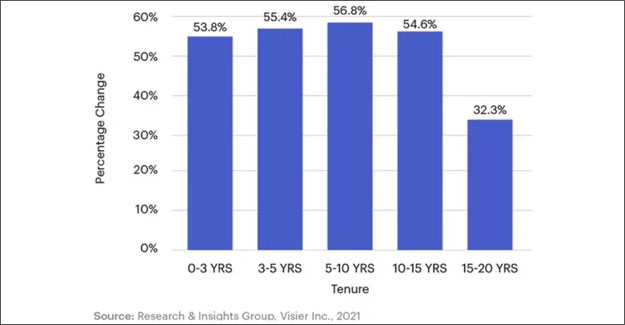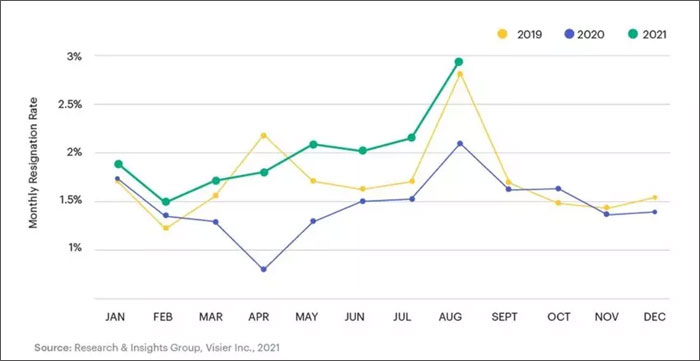
What’s Driving ‘The Great Resignation’?
- People are quitting their jobs at a record pace in what’s been dubbed the Great Resignation.
- Many want flexible working and greater support for mental health from companies.
- Addressing burnout is one of employers’ key challenges in retaining their best workers.
 This year has seen monthly resignation rates hit new highs.[/caption]
Why are so many people quitting their jobs?
People are quitting for a variety of reasons. Klotz said there have been “pent-up resignations” that didn’t happen in the worst of the outbreak when many people felt stressed and insecure. Some people may have made the decision in light of generous government benefits put in place during the pandemic, and others were probably just hunting for a better salary.
But there seem to be deeper reasons behind the historic exodus. Many people are exhausted and burned out after working too hard for too long during the pandemic. A recent study in Harvest Business Review found that resignations have been highest in industries that experienced a surge in demand during the pandemic, led by tech and health care.
Rising mental health concerns
The turmoil of the pandemic took a heavy toll on everyone. When employers didn’t provide sufficient support for their workers, the tough times got even tougher. Just two-thirds of respondents in a recent survey commissioned by Modern Health said their employers cared about their mental wellbeing.
A third of workers – managers and non-managers alike – said in the survey that they were considering changing companies for the sake of their mental health. Not surprisingly, addressing burnout, as well as the grief and loss many people have endured, is one of the key challenges for employers trying to hold on to their best workers, according to McKinsey & Company.
Flexible working is here to stay
After months of working from home, freed from the expense and hassle of commuting and with more time for family and other pursuits, a lot of people are reluctant to return to the office full-time.
More than a third of respondents in a recent Beamery survey said their work-life balance was better at the height of the pandemic, and 42% want flexible working to continue. Many companies are responding by embracing flexible schedules as part of the new normal.
Mid-career change
A range of studies has shown that resignation rates have risen fastest among mid-career employees, led by those with a tenure of five to 10 years. This may reflect the fact that many people delayed making a move in 2020 because of heightened uncertainty, as well as increased workloads and burnout.
And women are quitting at higher rates than men, a trend that pre-dates the Great Resignation but has accelerated in 2021, according to Visier.
This year has seen monthly resignation rates hit new highs.[/caption]
Why are so many people quitting their jobs?
People are quitting for a variety of reasons. Klotz said there have been “pent-up resignations” that didn’t happen in the worst of the outbreak when many people felt stressed and insecure. Some people may have made the decision in light of generous government benefits put in place during the pandemic, and others were probably just hunting for a better salary.
But there seem to be deeper reasons behind the historic exodus. Many people are exhausted and burned out after working too hard for too long during the pandemic. A recent study in Harvest Business Review found that resignations have been highest in industries that experienced a surge in demand during the pandemic, led by tech and health care.
Rising mental health concerns
The turmoil of the pandemic took a heavy toll on everyone. When employers didn’t provide sufficient support for their workers, the tough times got even tougher. Just two-thirds of respondents in a recent survey commissioned by Modern Health said their employers cared about their mental wellbeing.
A third of workers – managers and non-managers alike – said in the survey that they were considering changing companies for the sake of their mental health. Not surprisingly, addressing burnout, as well as the grief and loss many people have endured, is one of the key challenges for employers trying to hold on to their best workers, according to McKinsey & Company.
Flexible working is here to stay
After months of working from home, freed from the expense and hassle of commuting and with more time for family and other pursuits, a lot of people are reluctant to return to the office full-time.
More than a third of respondents in a recent Beamery survey said their work-life balance was better at the height of the pandemic, and 42% want flexible working to continue. Many companies are responding by embracing flexible schedules as part of the new normal.
Mid-career change
A range of studies has shown that resignation rates have risen fastest among mid-career employees, led by those with a tenure of five to 10 years. This may reflect the fact that many people delayed making a move in 2020 because of heightened uncertainty, as well as increased workloads and burnout.
And women are quitting at higher rates than men, a trend that pre-dates the Great Resignation but has accelerated in 2021, according to Visier.

Textile Excellence
Subscribe To Textile Excellence Print Edition
If you wish to Subscribe to Textile Excellence Print Edition, kindly fill in the below form and we shall get back to you with details.












